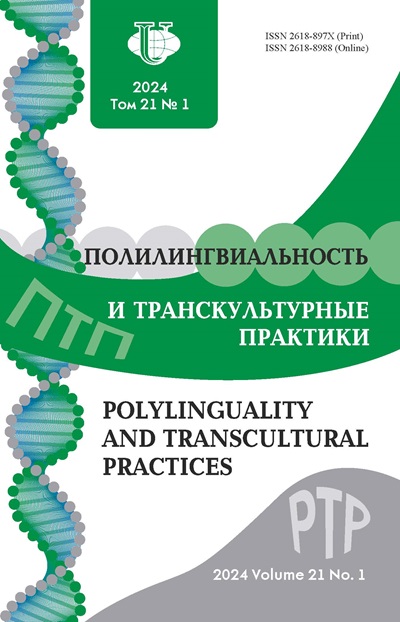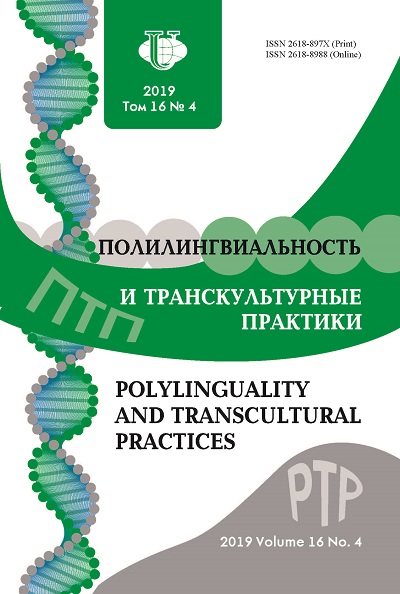Post-Colonial Theory and Literature: Sources and Problems of Development (a New Identity of a Post-Colonial Subject and Author)
- Authors: Shcherbak N.F.1
-
Affiliations:
- Saint Petersburg State University
- Issue: Vol 16, No 4 (2019)
- Pages: 515-527
- Section: LITERARY SPACE
- URL: https://journals.rudn.ru/polylinguality/article/view/22552
- DOI: https://doi.org/10.22363/2618-897X-2019-16-4-515-527
Cite item
Full Text
Abstract
The main aim of the article is to consider major works related to the development of post-colonial theories as well as literary sources. The term “post” is considered together with main vectors in the development of Anglophone, Francophone post-colonial literature. In relation to the historic view of colonies existence main tendencies in the development of imperial and anti-imperial theories are considered including those of Fanon, his view of the three-level development of the identity of the colonized and psychic problems that are encountered in the process of this development. F. Fanon looks at the first level of colonial assimilation, which inevitably brings to the second phase, the phase of change and distruction which then is followed by the stage of the author’s identity restoration by means of coming back to the cultural traditions and struggle during which the subject of the colony starts his struggle against the oppressed. Main views of E. Said and his views on orientalism are discussed which aim at striking at the roots of the binary opposition the west and the east proposed by white male critics. Instead a more subtle view is suggested. The views of G. Spivak and a more feminist approach are considered as well as the works by Homi Bhabha applying a more lacanian approach to hermeneutics, the views that form a new identity pattern observed in post-colonial literature thus maintaining a completely different view of post-colonial fiction.
About the authors
Nina F. Shcherbak
Saint Petersburg State University
Author for correspondence.
Email: alpha-12@yandex.ru
SPIN-code: 7253-0707
PhD in Philology, Associate Professor of the Department of English Philology and Linguoculturology
7/9, Universitetskaya nab., St. Petersburg, 199034, Russian FederationReferences
- Lazarus, N. 2011. The Postcolonial Unconscious. Cambridge: Samridge University Press. 299 p.
- Boehmer, E. 1989. Postcolonialism in Modern Literary theory. Ed. by Ph. Rice and P. Waugh. London: Bloomsbury Acadmic. P. 340—361. Print.
- Boehmer, E. 1994. Colonial and Post-colonial Literature. Migrant metaphors. Oxford: OUP. Print.
- Post-colonial Discourse in Post-Colonial Theory: A Reader (Ed. by Patrick Williams (Editor), Laura Chrisman (Editor) Columbia University Press, 1994. 570 p. Print.
- Ashcroft, B., Griffiths G., and Tiffin H. 1989. The Empire Writes Back: Theory and Practice in Post-colonial Literatures. London: Methuen. Print.
- Brennan, T. 1989. Salman Rushdie and the Third World. London: Macmillan. Print.
- Elliott, A. 2002. Psychoanalytic Theory: An Introduction. New York: Palgrave. Print.
- Fanon, F. 1952. “The Negro and Psychopathology” in Black Skin, White Masks. France: Éditions du Seuil. Print.
- Fanon, F. 1965. The Wretched of the Earth. Macgibbon and Kee. Print.
- Anderson, B. 1983. Imagined Communities. Reflections on the Origin and Spread of Nationalism, Verso. P. 1—213. Print.
- Losev, L. Smert’ Edvarda Saida, ili energiya zabluzhdeniya. Web. URL: http:/www.golos-ameriki. ru/Russian/archive/2003-10/a-200310-14-6-1.cfm
- Nandy, A.1995. “An Anti-Secularist Manifesto”, India International Quarterly 22 (1): 35—64. Print.
- Said, E. 1993. Culture and Imperialism. New York: Vintage Books (Random House). Print.
- Gefter, M. 2016. Kriticheskaya blizost’: interv’yu s Gayatri Chakravorti Spivak. «Dusha zakalyaetsya na medlennom plameni»: intellektual — o tom, kak nachat’ s nulya». Zhurnal «Mikhail Gefter», 28 sentyabrya, 2016. Elektronnyi resurs. URL: http://gefter.ru/archive/19537
- Gilbert, S.M., Gubar S. 1979. The Madwoman in the Attic: the Woman Writer and the Nineteenth Century Literary Imagination. N. Y. Print.
- Spivak, G. 1990. The Post-Colonial Critic: Interviews, Strategies, Dialogues, ed. Sarah Harasym [New York, 1990], p. 114. Print.
- Bhabha, H. 1994. “Of Mimicry and Man: The Ambivalence of Colonial Discourse” in The Location of Culture. Web.URL: http://prelectur.stanford.edu/lecturers/bhabha/mimicry.html
- Bhabha, H. 2001. Of Mimicry and Man: The ambivalence of colonial discourse // Modern literary theory / Ed. by Ph. Rice and P.Waugh. New York: Bloomsbury Academic. Pp. 380—387. Print.
- Dirlik, A. 1994. The Postcolonial Aura: Third World Criticism in the Age of Global Capitalism. Critical Inquiry 20 (Winter 1994). University of Chicago.















